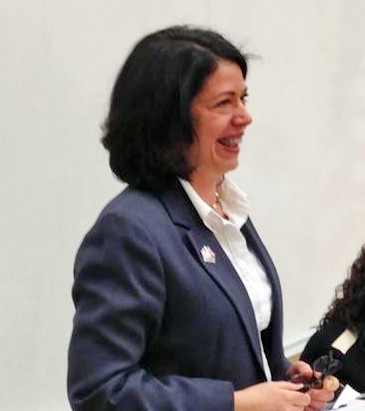 Steve Ross
Steve Ross
New chair of the TNDP Mary Mancini
NASHVILLE — For the first time in Tennessee Democratic Party history, a woman has been voted in as chair. Mary Mancini of Nashville won 61 votes from the party’s state committee on Saturday, versus 9 for runner-up Lenda Sherell.
“Voted in” is the key phrase, as Jane Eskind, who led the party in the ‘90s, was appointed to the position, but Mancini was the first woman to be directly elected.
That two women, Mancini and Sherell (who gave Republican 4th District congressman Scott DesJarlais a run for his money in the 2014 election), were the finalists was also an historical first.
Mancini, who was a candidate for the state Senate last year, is a former blogger and radio announcer, as well as a small businessperson and filmmaker. She entered public life as an activist and continued as proprietor of Liberadio and director of Tennessee Citizens Action.
One factor in her election was that she has always been a strong supporter of grassroots politics in Tennessee, while still maintaining relationships with the fund-raising community.
Wade Munday, another Nashvillian who was a candidate for chair in 2011 and was reelected partu treasurer inSaturday’s election said, “This is the first day of a great two years ahead for Tennessee Democrats. By 2016, we will have another Democrat in the White House and more democrats in Nashville. We have a lot of reasons to be more hopeful than before.”
Those sentiments were seconded by Shelby County Democratic Party chair and current democratic operative Matt Kuhn, another former candidate for chair, who said, “Mary will lead a much more unified party because of the consensus style in which the election took place. Compared to years past, the stage is set for the many players to work together.”
Kuhn added, “Mary Mancini will be a great conductor for the progressives in Tennessee.”
Saturday’s meeting ran long, and at the end of it outgoing chairman Roy Herron, on his feet again after a recent heart attack, gave his last speech as chair, reminding the executive committee,” We defeated the Koch Brothers, and we won five out of seven targeted races.”
In her acceptance speech following election, Mancini told the executive committee, “Each of us has a role to play. Now is the time for us to step up, And I quote, ‘We are the ones we’ve been waiting for.'”
Long-term activist and political consultant Alma Sanford was pleased by the decision, noting that 223 years after Andrew Jackson created the Democratic Party, a woman had finally been elected to lead the party.
“It’s a good day,” Sanford said.
Memphis blogger and democratic activist Steve Ross said he was glad about the vote for Mancini.
“It’s good to see someone take the helm for the TNDP from the activist side of the party instead of from the establishment,” Ross said. “We couldn’t continue doing what we are doing, not gaining ground. I think we have are going to be okay now.”
After the day’s event, Mancini said, “The most exciting thing about being elected chair of TNDP is the opportunity I’ll have to work with Democrats from all over the state and from all walks of life who are fired up and ready to go. I’m not in this alone.”
